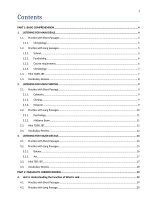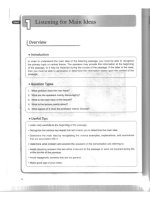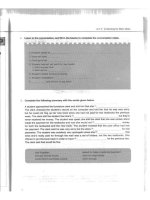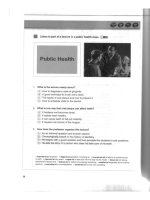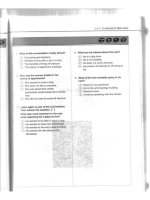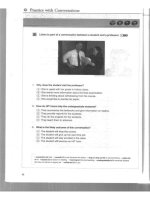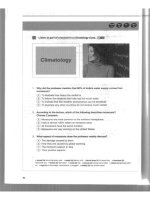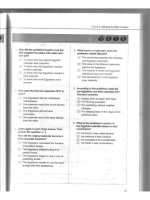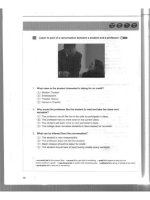From how to master listening skill LECTURE READY version 1
Bạn đang xem bản rút gọn của tài liệu. Xem và tải ngay bản đầy đủ của tài liệu tại đây (258.2 KB, 53 trang )
1
Contents
2
PART 1: BASIC COMPREHENSION
1. LISTENING FOR MAIN IDEALS
1.1. Practice with Short Passages
Fresh man (n): a first-year student
xample: I had the same problem last year when I was a freshman
Hold on (v): to wait, to stop
Sociology (n): the study of society and social behavior
xample: I have a sociology class at 2 o’clock. The teacher’s name is James Smith.
1. What is the man’s problem?
→ He cannot find his classroom.
2. How did the man solve his problem?
→ A female student showed him because she was going the same way.
Mathematical Ideas (n): a study in the historical development of mathematical thinking
To be nervous of/about (a): worried about; anxious about
xample: I am going to have mathematical ideas this semester. I am a little bit nervous of that
subject because I am not really good at math.
Thoroughly (ad): completely → thorough (a): cẩn thận, kỹ lưỡng
≠ Though (conjunction, ad, as though: dường như, như thể là)
≠ Throughout (prep, ad): từ đầu đến cuối, khắp
≠ Through (prep): xuyên qua, qua
A grade (n): an academic mark; a score
xample: If you study them thoroughly, you will even not read the textbook. I am bad at math
but I got a good grade.
1. What is the man’s problem?
→ Mathematical ideals is difficult for him.
3
3. What does the man have to do to get a good grade?
→ Listen to the lectures carefully and do well on the homework.
1.1.1. Climatology:
Physical geography (n): the study of the natural features of the earth’s surface
Climatology (n): the scientific study of the climate
Astronomy (n): the scientific study of the out space
1. What is the main topic of the lectures? → physical geography
2. Which statement is correct about physical geography?
→ Physical geography uses many other sciences.
Semester (n): one or two periods that make up a school year.
To hand out (v): to give out; to distribute
xample: Some of you may think the tests are too difficult with too many questions. But that
is not so. As a master of fact, there will be a summary handout every class this
semester. And if you study them well, then the tests will be very easy.
Participation (n): the act of taking part in an activity or event
1. What is the teacher mainly taking about? → tests and grades
2. What do students do to get a good grade?
→ They must study the handouts and actively participate in the class.
1.2. Practice with Long passages
1.2.1. School
To suggest (v): to put forward (đưa ra) a plan or idea
xample: It is really difficult to study without any help. Actually, one of my friends told me
that she fail this course before. She suggested that I go to the Academic Skills
Center if I need help.
Recommendation (n): advice; proposal
xample: Recommendation letter
Application (n): request; claim (sự đòi hỏi)
To apply for (v) = to fill in/out application form
4
xample: Do we have to pay for it? → No, it is a free service that the school provides for
students who need it. We can just walk in and sign up by completing application.
To walk in (v) ≠ to make an appointment (v)
1. What are the students talking about?
→ Having tutors for the course.
3. What is the Academic Skills Center?
→ It’s a free service that the school provides to students who need tutoring.
1.2.2. Fundraising
Volunteer (n): someone who does work without being paid for it
xample: You know I do some volunteer works in m free time, don’t you?
Underprivileged (a): deprived; disadvantaged
xample: I do a lot of work with underprivileged children.
Fundraise (v) → fundraiser (n): buổi quyên góp
1. What are the speakers mainly discussing? → Helping children who need help.
2. How does James to want to help children who need help?
→ By running a fundraising campaign.
1.2.3. Course requirement
Requirement (n): something needed; what is necessary → to require
To meet the requirements = To satisfy the needs
xample: There are the four major requirements you have to remember during this course.
Syllabus (n): an outline of topics for course of study
Oral (a): spoken; not written
Summit (v): to give something to somebody; to hand in ≠ to hand out; to turn in
To gain, earn, get = to achieve → achievement (n) = accomplishment
To expel = kick out (v) → 3 late = 1 absence
1. What is the main topic of the lecture?
→ The course requirement for good marks
5
3. How can students receive a good grade?
→ Students need to write a course paper about the broad topics discussed in class.
1.2.4. Climatology
Climate (n): the general weather condition
Global (a): relating to all the world; worldwide
xample: What about a global climate? … it’s the sum of all of the climates of the planet
added up.
Temperature (n): the degree of heat or cold
Decade (n): a period of ten years
Environment (n): the surroundings that we live in
-ology (n): ngành học
1. What is the lecture mainly about? → climate
2. What is the global climate?
→ It is a combination of worldwide climates.
1.3. Mini TOEFL iBT
Timely (ad): đúng lúc, hợp thời
1. What is the main topic of this conversation?
→ New life at college is a challenge for both.
3. What did they decide to see the RA?
→ To become the roommate.
4. Why does student B say this: “Wow, you are really far from home out here in New York
City – Yeah, New York is really different from LA. This is my first year at the college. It’s
a new life for me … almost. And I also live in the dorm. I hope I can meet many students
as I can and learn something from all of them”?
→ He is actually nervous about college life.
5. What is the lecture mainly about?
→ Picasso’s great talent
6. According to the lecture, why do the most well-known scholars still find the meaning
of the painting beyond their understanding?
→ The painting has a complexity of symbolism.
6
7. Listening again to part of the lecture, and answer the question. What does the
professor imply when she says this: “There is a complexity of the symbolism in the
painting. It doesn’t portray the event directly”?
1.4. Vocabulary Review
Specific (a) detailed and exact
Decade (n) a period ten years
Recommendatio
n
(n) a suggestion that someone should have or use something
because it’s good
To explore (v) to examine thoroughly
Brief (ad
)
shortly; in a concise manner
To disturb (v) to destroy the peace or tranquility of
Nervous (a) sensitive; excitable; timid
Evolution (n) a process to a more advanced stage
Opportunity (n) a time or place favorable for executing a purpose
To combine (v) to mix different elements together
To wrench (v) to pull or twist violently in order to move or remove
To participate (v) to take part in or to join in
Bombardment (n) a strong and continuous bombing attack
Approval (n) A formal or official statement that something is acceptable
To display (v) to put something in a particular place to be seen
1) Let me introduce four major requirements during this course.
2) Let’s talk about tests first.
3) It’s really hard to find the classrooms on this campus.
4) No later than the class session, your topic must be approved by me.
5) On the contrary, global warming, for example, has change a lot in the Artic in
recent years.
6) I am not really good at science.
7
2. LISTENING FOR MAIN PURPOSE
2.1. Practice with Short Passage
2.1.1. Cafeteria
To go over a lesson: ôn lại bài
To tackle (v): tìm cách giải quyết
Besides (ad): in any case
Cafeteria (n): a restaurant where you serve yourself and pay the cashier
1. Why does Cindy ask John about the cafeteria?
→ She wants to know the location for Jenny.
2. Why doesn’t Cindy want the food the cafeteria?
→ She has a bad memory about the food.
2.1.2. Cloning
Sociology (n): the study and classification of human societies
Cloning (n): making identical (đồng nhất) copies
Ethics (n): motivation based on ideas of right and wrong: đạo đức học
Unexpected (a): unforeseen
Turnout (n): produce
xample: Some people say it is good because it enables vital body parts to grow for sick
people. While others say it is bad because it damages the spirit of God. Moreover,
there are people saying it should be stopped because things can have an unexpected
turnout in science.
Touchy (a): sensitive
1. Why do the students discuss cloning?
→ Because a student has trouble finding the right topic for sociology class
8. Which reason does Jason say that cloning is bad?
→ It ruins the spirit of God.
8
2.1.3. Emperor
Assassination (n): killing
Innovation (n): a creation resulting from study and experimentation: sự cải tiến
Dignified (a): self-respecting (a): lòng tự trọng
Retirement (n): the state of being retired from one’s business or occupation
xample: All army doctors were entitled to attend the new army’s medical school and were
given dignified titles, land grants, and special retirement benefits. Before this,
doctors had a fairly low status.
1. What is the main purpose of the lecture?
→ To illustrate how Roman doctors were in the first century
9. Why did Roman doctors attend the army’s medical school according to the lecture?
→ They were keys to the army
Clarify (v): make clear
Intentional (a): by knowing purpose → to intend (v) → intention (n) → intentionally (ad)
≠ Accidental (a) → accidentally (ad)
On purpose (ad) = by chance (ad): tình cờ
1. What is the main purpose of this talk?
→ To explain handball violations in soccer
10. What will follow this lecture?
→ The role of intentions in handball violations
2.2. Practice with Long Passages
Concerned (a): involved in or affected by
Wink (n): the blink of an eye
Response (n): an answer or reply
xample: Send your outline to him by e-mail. He said e-mail would better for him. And I’m
sure you will get his response very quickly.
1. What is the main purpose of this conversation?
9
→ The man wants to know if the teacher can review his outline before the test.
11. Why does the woman think everything will work out just fine?
→ The teacher will look at the man’s outlines before the exam
Equipment (n): the necessary things for an expedition or voyage
In charge of (ad): in control of = be on duty = responsible for
Rapids (n): a part of river where the current is very fast
Paddle (v): to propel a canoe or small sport with short, light oar used without an oarlock
Tips (n): strategy = technique = suggestion
1. Why is the student asking his friend about rafting?
→ He wants to know if rafting is dangerous
12. According to the conversation, why did they go feet first when they fall in the water?
→ To avoid hitting a rock or something
2.2.1. Psychology
Complicated (a): difficult to analyze or understand
xample: Why do countries go to war? That is a complicated question.
Disagreement (n): a difference of opinion or sentiment (tình cảm)
Negotiation (n): a discussion intended to produce an agreement
Clear the air (phr): to make differences or negative emotions go away (sua tan không khí nặng
nề)
xample: When people disagree, they usually try to resolve their differences peacefully
through negotiation; sometimes they clear the air; other times they don’t.
1. What is the lecturer trying to show the students?
→ War happens because of human nature.
13. According to the lecture, what is not a reason for one nation to argue with another
nation?
→ Hunting and gathering.
2.2.2. Midterm Exam
Midterm (a): in the middle of academic term
Definitive (a): supplying or being a final or conclusive settlement (cuối cùng, dứt khoát)
10
Critical (a): forming or having the nature of a turn point
xample: Many of the questions on this exam don’t have definitive answers. I wish to assess
your critical thinking ability and your ability to combine ideas.
Compile (v): to put together; to construct; to build (làm cái mới bằng cách lấy mỗi thứ 1 cái)
1. Why does the professor explain the midterm exam?
→ He wants to help the student get a good grade.
14. According to the lecture, why does the professor suggest the students write trial
outlines before the exam?
→ It helps students organize their answers well.
2.3. Mini TOEFL iBT
Fencing practice (n): tập kiếm
To catch up on/with (v): học để theo kịp
To do chores (v): làm công việc lặt vặt
Spare time = free time = leisure (n):
1. What is the main purpose of this conversation?
→ To set appointment for fencing practice
15. Which of the following is not true according to the conversation?
→ Peter is not a good friend to Jim.
16. Listen to part of the conversation, and answer the question. “What about Monday?
Monday is not good either. I haven’t studied sociology at all… I have an exam on
Tuesday in the afternoon, so I have to catch up on that. And don’t you have an essay due
in your English class on Tuesday? Oh, I forgot about that. Yeah. Anyways, I am going to
finish that during first period at school. So, what about Tuesday. Uh, I have soccer
practice from 4:00 to 5:30, and after that, I have to do my homework”. Why can’t Peter
practice fencing with Jim on Tuesday.
→ He has an exam, soccer practice, and homework during the day.
2.4. Vocabulary Review
Wound (n
)
any break in the skin or an organ
Argue (v) to debate or discuss
Nourishmen
t
(n) a source of materials to nourish the body
11
Instinctive (a) acting or produced without reasoning
Prompt (v) to give an incentive
Transfusion (n) transferring the blood of one man into another
Familiarity (n) a close or warm friendship
Vital (a) very necessary; highly important; essential
Intentional (a) by conscious design or purpose
Significant (a) important in effect or meaning
Digest (v) to take in or absorb through one’s body
Defend (v) to take action in order to protect something
Affect (v) to influence something or someone to change in some way
Nourish (v) to provide someone or something with the flood that is
necessary
Donate (v) to present or contribute in an effort to help
1) War is as old as organized society.
2) As a matter of fact, I already have some outlines to write.
3) It is now recognized as an international icon for peace.
4) I remember he said email would work better than for him.
5) I bet you knew that you weren’t supposed to use your hands.
6) You can’t put a wall between you and your neighbors when things go wrong.
12
3. LISTENING FOR MAJOR DETAILS
3.1. Practice with Short Passages
Political science (n): the study of the principles and structure of government and of political
institution
Regret (v): to be distressed about
Politics (n): the art or science of government
Constitution (n): the system of fundamental laws and principles
Get familiar with vocabulary, laws, and events.
xample: I have a problem with my political science class. Literally, I know nothing about it
and regret taking it. I should have dropped the class.
1. What subject is the woman concerned about? → Political science
2. What does the man suggest that woman do to do well in political science?
→ Concentrate on vocabulary, laws, and events.
Tough (a): difficult
Skip (v): to pass from point to point
Foreign language (n): a language not spoken by the indigenous people of a certain place
Fit (v): to provide a place or time for
xample: You are going to skip a foreign language? Why? You are going to forget it if you
stop using the language?
1. Why doesn’t Cindy take Spanish class next semester?
→ Because Mr. Rodriguez is not teaching next semester.
3. Why is Annie convincing Cindy to continue to take Spanish class next semester?
→ Because Cindy might forget Spanish.
Cell division (n): the process by which a cell divides to form two daughter cells
Phase (n): a stage of development
Disappear (v): to vanish
Inward (a): (vào phía bên trong) inner
13
→ -ward (a, direction): upward, downward, forward (về phía trước)
Produce (v): to make → Product (n)
xample: Mitosis is a process of a cell division. As a result of cell division, two daughter cells
are produced from a single parent cell… Mitosis includes four phases called
prophase, metaphase, anaphase, and telophase.
1. What is mitosis?
→ Mitosis is a cell division that involves four phases.
4. What happens in prophase?
→ The chromosome duplicate to form chromatids.
Native (a): being such by birth or origin → native language = first language = mother tongue
Mediator (n): (người hòa giải) one that reconciles differences between disputants (người tranh
luận)
Capture (v): to seize
Diplomatic (a): (ngoại giao) involving diplomacy or diplomats
1. What role did Pocahontas play between the British colony and the Native
Americans?
→ Pocahontas was a spy for the British colonists.
5. What did the marriage between Pocahontas and John Rolfe do to the war between
the British colony and Native Americans?
→ The marriage ended the war. = As we all know, this marriage brought the war to
its end.
3.2. Practice with Long Passages
Struggle (v): to strive; to give it one’s best shot → get it a shot/try
Thoroughly (ad): completely = carefully = wholly = totally = fully
Earnestly (ad): (nghiêm túc) seriously
Comment (n): a statement of fact or opinion
Impossible (a): cannot be done or cannot happen
Councilor (n) = counselor (n) = academic advisor (n)
14
xample: She spoke softly and explained thoroughly. She answered all of the questions
earnestly. I wish all my teacher were like Ms. McKenna.
Many of her students made that comment in the past, too.
I believe so. I should have tried harder instead of giving up and neglecting the hard
subjects.
1. Why does the student like Ms. McKenna so much?
→ Ms. McKenna spoke softly, explained carefully, and answered all of the questions
seriously.
2. What did the student realize at the end of the conversation?
→ The student realized that she can do things if she tries hard.
Completely (ad): = wholly = totally
Effort (n): the use of physical or mental energy to do something
Amazing (a): causing great surprise or wonder; extraordinary
Tremendously (ad): extremely large in amount, extent, or degree
Be grateful to someone/something: cảm kích, biết ơn ai/ vì cái gì
(n)-ize (v): urbanize, modernize, industrialize
Persuade (v): to talk someone into something = to convince
Satisfy with (v):
xample: … thank you, without your help, I probably would have failed this class. You made
economics class so easy and fun for me.
Well, you are the one who tried hard and put in the time and effort. If you weren’t
showing any effort, I probably wouldn’t have helped you.
You encourage me to put in the effort and try my best.
It’s my job to help students learn and succeed in the future.
You are an amazing teacher. I wish you could teach all my classes.
I’m sure you are going to meet tremendously talented and helpful teachers
throughout your school life. Come by whenever you need help.
1. Why is the student grateful to the teacher?
→ The teacher encouraged and helped the student to do well in economics class.
3. What does the teacher believe teachers should do for their students?
→ Help students to learn and succeed in the future.
15
3.2.1. Botany
Humidity (n): dampness
Respiration (n): an organism exchanging gases with its environment
Dissolve (v): to cause to pass into a solution
Substance (n): that which has mass and occupied space
xample: Topic’s today is on plants and water. As you all know, water is very important for all
the living things on the Earth. We can’t live without water. So do plants. Water plays
a very important part in the plants.
… I remember learning it in junior high. Isn’t it a process which involves water and
sunlight.
Yes, exactly. Let’s see how much you remember what you were taught in junior
high. Who can tell us about photosynthesis more in detail?
1. What is a process which involves water in plants?
→ The process is called photosynthesis.
4. What factors play an important role in the plant respiration process?
→ Air movement and humidity play a vital role in the respiration process.
3.2.2. Art
Bison (n): a buffalo
Interpret (v): to explain the meaning of
Schematic (v): of, relating to, or in the form of a scheme or diagram
Tribe (n): a group of people with the same race, language, and customs
xample: The animals are mostly of bison, horses, and deer. The most common themes in the
cave paintings are large, wild animals such as bison, horse, aurochs, and deer.
Anthropologist Abbé Breuil interpreted the painting as being hunting magic. That is
to say, they were meant to increase the number of animals.
1. What is anthropologist Abbe Breuil’s interpretation of the animal painting?
→ The animal paintings were taken as hunting magic, meant to increase the number
of animals.
5. How are the paintings of the humans portrayed when compared to the animals?
→ They are rare and usually schematic.
16
3.3. Mini TEFL iBT
xample: Why don’t we stick with a car wash?
1. What do the students think is the top priority in deciding the type of fundraising?
→ The top priority is profits.
2. According to the students, why should they have an limited number of items?
→ Because more items will attract more customers and increase sales
3. Listen again to part of the conversation, and answer the question. “” Why does the
man oppose a car wash for fundraising?
→ A car wash takes too much time.
4. What subject is dominant in Virginia Woolf’s book A Room of One’s Own?
→
5. What is the important idea expressed in Three Guineas?
→
6. Listen again to part of the lecture, and answer the question. What did the man mean
when he said this? “”
→
3.4. Vocabulary Review
Convert (v) to persuade or induce to adopt a particular religion, faith, or
belief
Semester (n) one of two divisions of 15 to 18 weeks each in an academic year
Mediator (n) one that reconciles differences between disputants
Earnestly (ad
)
marked by or showing deep sincerity or seriousness
Term (n) a word or group of words having a particular meaning
Effort (n) the use of physical or mental energy to do something
Identical (a) being the same
Dispose (v) to get rid of; to throw out
Interpret (v) to explain the meaning of
Substance (n) that which has mass and occupies space
Dissolve (v) To be mixed with liquid and disappear or to melt
Hinder (v) To make something difficult to progress
Segregate (v) To keep things physically or spiritually apart from each other
Approximate (a) Not precise but close to something
Penetrate (v) To get into or pass through something
1) Once you get to focus on the vocabulary, laws, and events, it will be more
interesting
17
2) As I remember, water is taken up by the roots and travels up to the leaves.
3) I’m used to his teaching style.
4) Depending on the plants, some can store water longer than other.
5) Nothing is ever a dream when you try your best.
6) I’d rather wait and take his class.
18
PART 2: PRAGMATIC UNDERSTANDING
4. Unit 4: Understanding the Function of What is said
4.1. Practice with Short Passages
Inquire (v): to ask, to question
Provide (v): to furnish; to supply
Tuition (n): a fee that students pay to gain a higher education
Enroll in (v): to register for; to sign up for
1. Why did the school administrator ask this? “Are you currently enrolled in this
school?”
→ Because the student need to register if he is not enrolled
7. What is the student trying to find out from the school administrator?
→ How to register for summer school
Plan (n): a scheme; a method
Input (n): a contribution; a say
Yosemite (n): a U.S national park
xample: Hey, Tyler. What are your plans for this summer?
Oh, I am going on a trip to Yosemite.
Wow, lucky you. Who are you going with? Are you going to camp out there?
I am going with my family, and we are taking a couple of tents and whole nine
yards.
When are you going?
We are living on June 25
th
and coming back on July 2
nd
.
Have you have been to Yosemite.
1. What can be inferred from the man’s statement here? “No, this is my first visit. I
really enjoy going to new places”
→ This is his first trip to Yosemite.
8. What does the woman think about Yosemite?
→ It is a great place.
Narrative (a): of, or in the form of, storytelling
19
History (n): past events
Personal (a): of a person; individual
So forth (ad) = so on = etc (et-tecera)
xample: Items should include your hobbies, talents, things you like, dislike, your passion,
goals, dreams, and so forth. Please turn in your outline by the next class. The
speeches will begin after you turn in your outline.
1. What did the lecture mean here? “You will provide this class with a general idea of
who you are”
→ You will talk the class about yourself.
9. According to the lecture, when does the speech begin?
→ The week after the outline is due
Ratio (n): one value divided by another
Geometry (n): the pure mathematics of points and lines and curves and surfaces
Approximately (ad): around; about
Appealing (a): attractive; inviting
xample: This ratio has a length to width ratio of approximately 1.618
1. Why did the lecturer say this? “If you are smart and know geometry, you will use the
golden ratio.”
→ Because this ratio is the most appealing and pleasing to the eye
10. According to the lecture, since when have men known about the golden ratio?
→ Since the early Greeks
4.2. Practice with Long Passage
Physics (n): the study of matter
Chemistry (n): the science of the composition, structure, properties, and reactions of matter
Join (v): to become part of
Calculus (n): the study of organisms’ functions and parts
xample: I will sign up for that class, too. I think Tom needs to take that class, too, so I have
him sign up for that class as well. =(I will ask Tom to take the same class)
1. Why did the man say this to the woman? “Let me know how your physics class goes”
20
→ Because he wants to know if she likes Mr. Brown’s lectures
4. What does the woman say about the professor?
→ Everyone says he is great.
Training (n): an activity leading to skilled behavior
Gear (n): equipment needed for an operation or sports
Fundamental (a): being or involving basic facts or principles
Individual (a): characteristic of or meant for a single person or thing
xample: Hi, what’s going on?
Do you have the summer baseball-training schedule?
Yeah, I don’t know the specifics, but I have a general idea. Why? Can you go to the
training?
Yeah, my summer plans have changed. My dad rearranged the plan so that I can go
to the training.
1. Why did Victor’s statement imply about the training when he said this? “And the
individual training will cover the position we would like to lean in a smaller group”
→ There will be small group training and team training.
2. Why is David able to go to summer training?
→ His dad changed the family’s summer plans.
4.2.1. Music
Sonata (n): a classical composition for solo instruments
Movement (n): a major, self-contained part of a symphony or sonata
Andante (a): at the moderately slow tempo
Variation (n): a repetition of a musical theme with modifications or embellishments
xample: It’s supposed to imitate the sound of the Turkish bands.
Andante grazioso is known for its main melody.
The third movement is known as the Turkish Rondo because it resemble the sounds
of the Turkish bands
1. What can be inferred from the student’s statement here? “I don’t know that the
Turkish music was that popular back then. Things are sure different from now”
→ Turkish music is not popular now.
3. Which music is being taught in his lesson?
21
→ Mozart’s Sonata No.11
4.2.2. History
Objective (n): an aim; a goal
Preserve (v): to continue, keep, or maintain
Advancement (n): a forward step; a development
Suffer (v): to feel pain or distress
Ego (n): an inflated feeling of pride
xample: As the war come close to an end, Confederacy suffered a great deal of economics
difficulties, and its stand on racism, poverty, and dishonesty also suffered.
How was the Union’s condition?
The Union lost many people but since they won the war, their ego and pride were
sometimes viewed conceited.
1. What did the professor mean when he said this? “The Civil War also marked the
beginning of a whole new generation of modern wars”
→ The Civil War introduced new types of war plans, weapons, communications, and
transportation.
2. How did the Civil War involve the public?
→ The public actually saw the War through photographs.
4.3. Mini TOEFL iBT
xample: Hi, I have a few questions about your camp program.
… Would your program suite me?
It is an immediate level camp, so it can be a bit challenging and not too easy.
… How does the program bring together participants?
… How much is the fee, when is the registration due?
The fee is $400, and the registration is due on July 18, 2006. Oh, and the camp is
co-ed. Do you have any other questions?
1. Why did the counselor ask this? “Do you like to camp and go hiking in general?”
→ To see if their camp level fits student
2. According to the counselor, what does the camp do to bring campers together?
→ Participants will be grouped into teams.
3. Listen again to part of conversation, and answer the question. “Then you should be
fine since you are athletic and athletic, and like hiking. It is an immediate level camp, so it
can be a bit challenging and not too easy.
22
That sounds good. I would rather deal with challenges than be bored.
That is exactly right. We will present you with tasks that will keep you busy both mentally
and physically”
→ The camp will be challenging but suitable for the student.
4. What did the professor imply when he said this? “The British inadvertently lost
something much more valuable”
→ The British lost colonies over tea.
5. According to the lecture, what was the real reason for the American Revolution?
→ The British reaction to the Boston Tea Party.
6. Listen again to the part of the lecture, and answer the question. “When the colonists
refused to pay for the destroyed tea, the British passed the co-called Intolerable Act. The
act closed to the port of Boston, decreased the colony’s self-government power, allowed
royal officers to be tried in England or other colonies, and placed troops in empty
buildings. ” Which answer describes the Intolerable Act the best?
→ The act undermined the colony’s independence.
4.4. Vocabulary Review
Decision (n
)
A conclusion; a judgment
Suffer (v
)
To endure; to feel pain
Damage (v
)
To spoil physically or stop something from working properly
Preserve (v
)
To save or protect something from damage or decay
Join (v
)
To became part of; to take part in
Terrible (a) Awful; dreadful
Contaminate (v
)
to make something dirty or harmful
Corruptive (a) Morally wrong, especially by doing something dishonest
Appealing (a) Attractive; inviting
Prevent (v
)
To stop; to avoid
Individual (n
)
of a person
Objective (n
)
A purpose; a goal
Popular (a) Well liked; admired
Athletic (n Sporty, healthy, and strong
23
)
Intensity (v
)
To become greater in strength, amount, or degree
1) I wouldn’t mind seeing one though.
2) Don’t let it get in the way of your studying.
3) Since I won’t have time, I will take him next semester.
4) It’s supposed to imitate the sound of the Turkish bands.
5) I’m interesting in the outdoor activity camp.
6) Have you ever been to Yosemite?
5. Understanding the Speaker’s Attitude
5.1. Practice with Short Passages
5.1.1. Winter vacation
Relaxing (a): helping you to rest and become less anxious
Productive (a): effective in achieving specified results
Tired (a): fatigued
Rent (v): to grant temporary occupancy or use of service
xample: Hey! Long time no see.
Hi! How are you? How was your weekend?
It was fantastic. I had so much fun. I wish it had been longer. How was yours?
Oh, you don’t want to hear about it. Anyway, what did you do to make it so
fantastic?
… Aren’t you tired after that busy schedule?
A little, but it was a productive weekend, so I’m okay.
1. What does the woman imply when she says this? “Oh, you don’t want to hear about
it.”
→ Her weekend was not so exciting.
7. What does the male student think about his weekend?
→ It was a productive weekend.
5.1.2. Library
Borrow (v): to obtain or receive something on loan
Creativity (n): having the ability or power to create
24
Favorite (a): best liked
Nonfiction (n): prose works other than fiction
xample: Hi, Jennifer, Let’s see what you are borrowing today. Are you sure can finish all
these in time?
Yes, I’m so into my mysteries these days. I can read them all night long. It is so
exciting to image and guess where the story is leading.
… I like mysteries, but I’m more into nonfiction that deals with politics and
business.
That sounds interesting, too!
Yes, it is interesting. Well you know your interests and thoughts change over time. I
might get interesting in mysteries like you some day. We will talk about those books
when I do.
That a wonderful idea. I have always hoped to discuss books with someone.
1. What does the librarian mean when she says this? “I like mysteries, but I’m more into
nonfiction that deals with politics and business.”
→ She likes nonfiction more than fiction.
8. What did the student always want to do with other mystery book readers?
→ She wants to discuss the books.
5.1.3. Fiber
Nutrition (n): a source of nourishment
Essential (a): necessary
Source (a): basis
Relation (n): a logical or natural association between two or more things
Consume (v): to eat
xample: Last week, we talk about food and its relation to health in general. Starting from
today, we will go into more detail. We are going to spend 6 weeks studying food and
health. We are going to start with fiber. First, I’m sure you have heard a lot about
fiber in general and I’m sure you have heard about the facts that I’m going to talk
about now…
1. What does the professor mean when he says this? “First, I’m sure you have heard a lot
about fiber in general and I’m sure you have heard about the facts that I’m going to talk
about now.”
→ People are aware that fiber is a good source of nutrients.
25
9. According to the professor, how should fiber be consumed?
→ Fiber should be consumed regularly.
5.1.4. Poetry
Create (v): to produce
Express (v): to make one’s feeling or opinions known
Portray (v): to describe in words
Intense (a): extreme in degree
Mundane (a): ordinary
xample: Let me ask you a question before I start. Do you love poetry, or do you have a
favorite poem? Some of you may answer “yes”, and some of you may answer “no”
to these questions. You might not have noticed, but we talk about poems and poetry
a lot in our daily life. What is written in poetry is a topic of our daily life. However,
we don’t have idea a clear idea of what poetry is. How would you define “poetry”? I
believe most of you are not so familiar with the meaning. Therefore, what I am
going to do is to define the word “poetry” for you. First of all, the word is of Greek
origin, and it means to make or create.
1. What does the professor imply when she says this? “You might not have noticed, but
you talk about poems and poetry a lot in our daily life”
→ Poetry is closely related to our daily life.
2. How much does the professor think that people know about poetry?
→ She thinks people know very little about poetry.
5.2. Practice with Long Passages
Enroll (v): to enter or register in a roll = sign up for
Request (v): to ask for
Easier (a): posing no difficulty
Flexible (a): accommodating
Personality (n): character = trait
xample: Hi, I got my schedule and I found that I was enrolled in the wrong class.
Let me see your schedule, so I can find out what went wrong.
Here we go.
… Let me check. Sometimes I have to switch classes around, but hopefully that’s
not the case for you.

